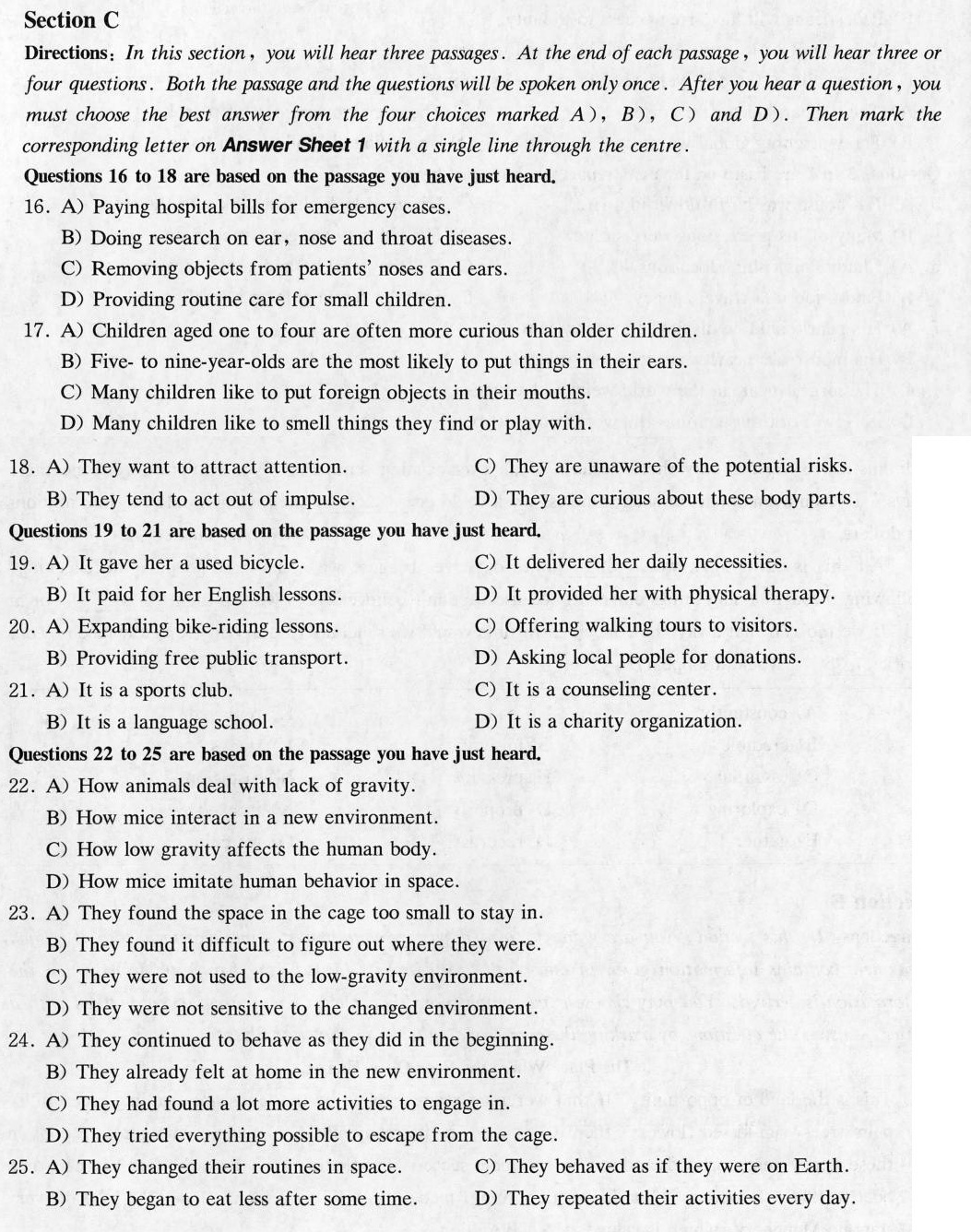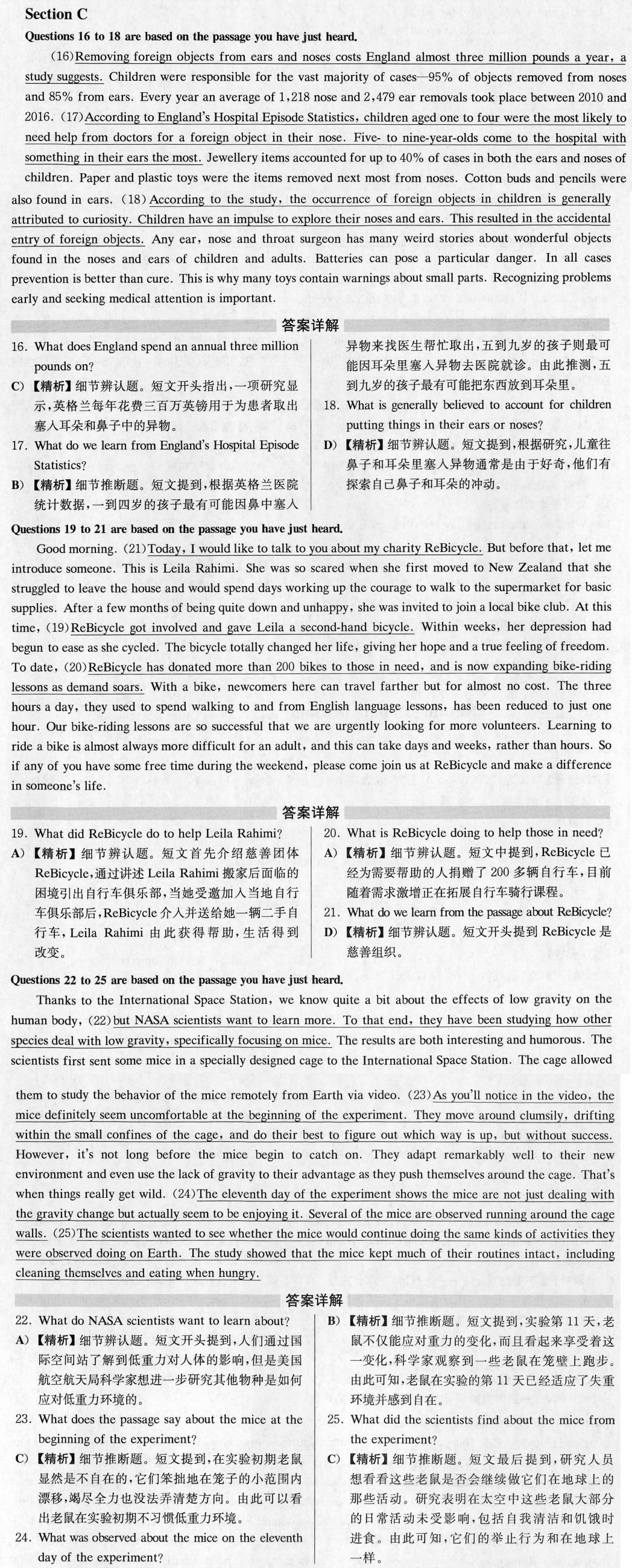题目
Section C-|||-Directions:In this section,you will hear three passages.At the end of each passage,you will hear three or-|||-four questions. Both the passage and the questions will be spoken only once.After you hear a question,you-|||-must choose the best answer from the four choices marked A),B),C)and D).Then mark the-|||-corresponding letter on Answer Sheet 1 with a single line through the centre.-|||-Questions 16 to 18 are based on the passage you have just heard.-|||-16.A)Paying hospital bills for emergency cases.-|||-B)Doing research on ear,nose and throat diseases.-|||-C)Removing objects from patients`noses and ears.-|||-D)Providing routine care for small children.-|||-17.A)Children aged one to four are often more curious than older children.-|||-B) -tomine-year-oldsar the most likely to put things in their ears.-|||-C)Many children like to put foreign objects in their mouths-|||-D)Many children like to smell things they find or play with.-|||-18.A)They want to attract attention. C)They are unaware of the potential risks.-|||-B)They tend to act out of impulse. D)They are curious about these body parts.-|||-Questions 19 to 21 are based on the passage you have just heard.-|||-19.A)It gave her a used bicycle. C)It delivered her daily necessities.-|||-B)It paid for her English lessons. D)It provided her with physical therapy.-|||-20.A) times Pandingbike-ridinglesoos. C)Offering walking tours to visitors.-|||-B)Providing free public transport D)Asking local people for donations.-|||-21.A)It is a sports club. C)It is a counseling center.-|||-B)It is a language school. D)It is a charity organization-|||-Questions 22 to 25 are based on the passage you have just heard.-|||-22.A)How animals deal with lack of gravity.-|||-B)How mice interact in a new environment.-|||-C)How low gravity affects the human body.-|||-D)How mice imitate human behavior in space.-|||-23.A)They found the space in the cage too small to stay in.-|||-B)They found it difficult to figure out where they were.-|||-C)They were not used to the low-gravity environment.-|||-D)They were not sensitive to the changed environment.-|||-24.A)They continued to behave as they did in the beginning.-|||-B) They already felt at home in the new environment.-|||-C)They had found a lot more activities to engage in.-|||-D)They tried everything possible to escape from the cage.-|||-25.A)They changed their routines in space. C)They behaved as if they were on Earth.-|||-B)They began to eat less after some time. D)They repeated their activities every day.Section C Directions:In this section,you will hear three passages.At the end of each passage,you will hear three or four questions. Both the passage and the questions will be spoken only once.After you hear aquestion,you must choose the best answer from the four choices marked A),B),C)and D). Then mark the corresponding letter on Answer Sheet 1 with a single line through the centre. Questions 16 to 18 are based on the passage you have just heard. 16.A) Paying hospital bills for emergency cases. B)Doing research on ear,nose and throat diseases. C) Removing objects from patients' noses and ears. D)Providing routine care for small children. 17.A)Children aged one to four are often more curious than older children. B)Five- to nine-year-olds are the most likely to put things in their ears. C)Many children like to put foreign objects in their mouths. D) Many children like to smell things they find or play with. 18.A) They want to attract attention. C) They are unaware of the potential risks. B)They tend to act out of impulse. D)They are curious about these body parts. Questions 19 to 21 are based on the passage you have just heard. 19.A)It gave her a used bicycle. C) It delivered her daily necessities. B)It paid for her English lessons. D)It provided her with physical therapy. 20.A) Expanding bike-riding lessons. C) Offering walking tours to visitors. B) Providing free public transport. D)Asking local people for donations. 21.A)It is a sports club. C) It is a counseling center. B)It is a language school. D)It is a charity organization. Questions 22 to 25 are based on the passage you have just heard. 22.A) How animals deal with lack of gravity. B) How mice interact in a new environment. C) How low gravity affects the human body. D)How mice imitate human behavior in space. 23.A) They found the space in the cage too small to stay in. B)They found it difficult to figure out where they were. C) They were not used to the low-gravity environment. D)They were not sensitive to the changed environment. 24.A)They continued to behave as they did in the beginning. B) They already felt at home in the new environment. C) They had found a lot more activities to engage in. D)They tried everything possible to escape from the cage. 25.A) They changed their routines in space.C) They behaved as if they were on Earth. B)They began to eat less after some time.D)They repeated their activitics every day.

Section C Directions:In this section,you will hear three passages.At the end of each passage,you will hear three or four questions. Both the passage and the questions will be spoken only once.After you hear aquestion,you must choose the best answer from the four choices marked A),B),C)and D). Then mark the corresponding letter on Answer Sheet 1 with a single line through the centre. Questions 16 to 18 are based on the passage you have just heard. 16.A) Paying hospital bills for emergency cases. B)Doing research on ear,nose and throat diseases. C) Removing objects from patients' noses and ears. D)Providing routine care for small children. 17.A)Children aged one to four are often more curious than older children. B)Five- to nine-year-olds are the most likely to put things in their ears. C)Many children like to put foreign objects in their mouths. D) Many children like to smell things they find or play with. 18.A) They want to attract attention. C) They are unaware of the potential risks. B)They tend to act out of impulse. D)They are curious about these body parts. Questions 19 to 21 are based on the passage you have just heard. 19.A)It gave her a used bicycle. C) It delivered her daily necessities. B)It paid for her English lessons. D)It provided her with physical therapy. 20.A) Expanding bike-riding lessons. C) Offering walking tours to visitors. B) Providing free public transport. D)Asking local people for donations. 21.A)It is a sports club. C) It is a counseling center. B)It is a language school. D)It is a charity organization. Questions 22 to 25 are based on the passage you have just heard. 22.A) How animals deal with lack of gravity. B) How mice interact in a new environment. C) How low gravity affects the human body. D)How mice imitate human behavior in space. 23.A) They found the space in the cage too small to stay in. B)They found it difficult to figure out where they were. C) They were not used to the low-gravity environment. D)They were not sensitive to the changed environment. 24.A)They continued to behave as they did in the beginning. B) They already felt at home in the new environment. C) They had found a lot more activities to engage in. D)They tried everything possible to escape from the cage. 25.A) They changed their routines in space.C) They behaved as if they were on Earth. B)They began to eat less after some time.D)They repeated their activitics every day.
题目解答
答案
